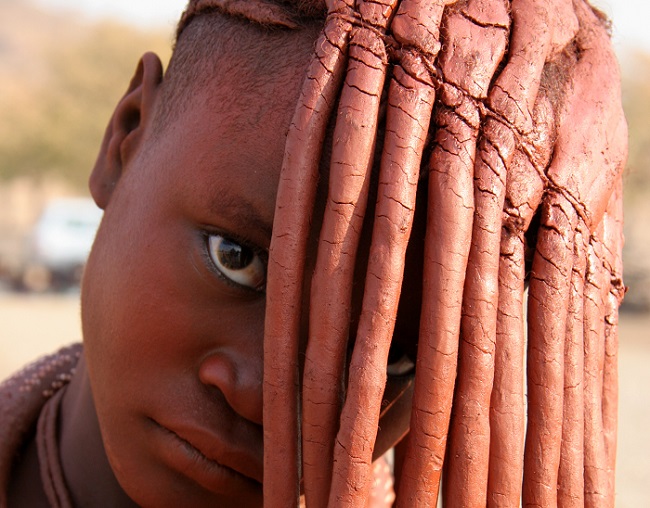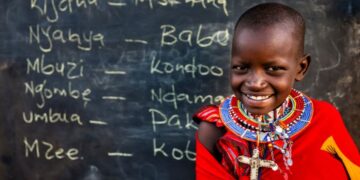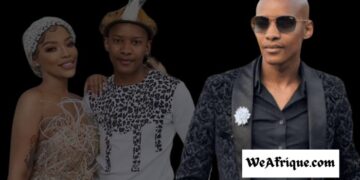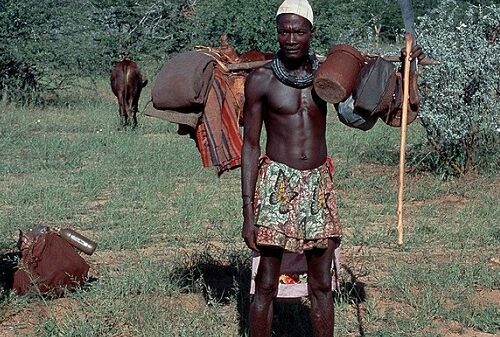- The Himba tribe is a semi-nomadic, pastoralist people who speak a variety of Herero called OtjiHimba
- The OvaHimba people as they are also called, still live in seclusion as they have continued to maintain and preserve their traditions and cultures
- A unique trait about the Himba people is their red skin which is gotten from the constant use of ‘otjize’
The Himba tribe is found in northern Namibia in the Kunene region and also on another side of the Kunene River in southern Angola. The people also known as OvaHimba, are semi-nomadic pastoralist people. Their language is called OtjiHimba which is a variety of Herero. The OvaHimba are regarded as the last nomadic people of Namibia.
The tribe has been isolated from most modern societies as the people have continued to maintain their traditional lifestyle and culture. They do not subscribe to western cultures.
Origin of the Himba Tribe
The word Himba is translated to mean beggar in the Otjiherero language. The origin of the Himba tribe can be traced back to the early 16th century after they crossed the Angolan border.
After surviving several disasters and war, the OvaHimba became refugees in a town called Opuwo. They later moved to the border of Angola but they soon became victims of kidnapping. They settled in Kaokoland which is now known as the Kunene region.
Tradition and Culture of the Himba Tribe
Their Perception of Colors
The Himba tribe has a unique way of seeing color. Research has shown that the OvaHimba use four color names. ‘Zuzu‘ stands for dark shades of blue, red, green, and purple; ‘vapa’ is white and yellow; ‘Buru’ is known as shades of green and blue; while ‘dambu’ is the other shades of green, red, and brown.
It is said that the OvaHimba people have exceptionally sharp vision. This is a result of their cattle rearing which always calls for the need to identify each cow’s marking.
The Himba Tribe Has a Unique Hairstyle and Clothing

The OvaHimba people wear traditional clothing. The women cover themselves with otjize paste, a mixture of butterfat, and ochre pigment. The women who have given birth attach a small backpack of skin to their traditional outfit with shoes made of cow skin. The men’s shoes are made from old car tires.
As for their hairstyles, the boys wear one braided plait from pubescence while girls carry many otjize-textured hair plaits which are arranged to veil the girl’s face. Newly married women wear an ornate headpiece called Erembe.
Single men only wear one braided plait that extends to the rear of their head while married men wear a cap or head wrap and also unbraided hair beneath the cap.
Aside from their traditional attires, the Himba women are not allowed to use water. They are only allowed to apply red ochre on their skin after their daily smoke bath. The women cover themselves with a blanket for a full body wash while the smoke gets trapped underneath it.
Their unique red skin is gotten from the ‘otjize’ paste applied on their skins. The function of the paste is to protect their skin from the harsh desert sun and also insect bites.
Read Also: Tall African Tribe – Are The Dinka People The Tallest In The World? 10 Facts
Religion
The Himba tribe is a monotheistic people. They worship the god Mukuru alongside their clan’s ancestors. The people believe that Mukuru only blesses while their ancestors can bless and also curse.
Every family has a sacred ancestral fire that is kept by the firekeeper. The latter is the one in charge of communing with the sacred ancestral fire every 7 or 8 days. This is to communicate with Mukuru and the ancestors on behalf of the family.
Traditionally, the OvaHimba believe in witchcraft (‘omiti’) also called Blackmagic. People tend to believe that death is caused by ‘omiti’. They also believe that evil people use witchcraft to instill bad thoughts in other people or cause unfortunate things to happen to other people.
Marriage and Childbirth
As part of the tradition of the OvaHimba, their men are allowed to marry more than one wife. However, the marriage is arranged by the father of the bride. They also practice early arranged marriages where young Himba girls marry male partners chosen by their fathers once they reach puberty. However, the practice is illegal in Namibia.
Also, it is customary for a boy to be circumcised before puberty. Once the boy takes a wife, he is considered a man while the woman is only considered a woman after childbirth.
Before marriage, the bridewealth must be negotiated between the groom’s family and the bride’s family. Most times, the payment is done with cattle, since the major source of their economy is the rearing of cattle. Before the cattle is accepted, it must appear of high quality. It is also acceptable to offer an Ox but it all depends on the groom’s father’s wealth.
There have been speculations that in the Himba culture when there is a visitor in the house, the only way the husband welcomes the guest is by giving the Okujepisa Omukazendu treatment. The wife spends the night with the guest while the husband sleeps in another room. They believe that the gesture fosters relations and reduces jealousy.
Also, when a Himba woman puts to bed, the date is not considered but rather assumed beforehand by the mother. The woman learns a song and teaches her partner alongside other women who would in turn sing the song to her. The song is usually remembered by the villagers and sung till the person’s last days.
However, it has been argued that the Himba song is just a myth about the Himba people.
Inheritance
The eldest male usually leads the different clans among the Himba tribe. However, inheritance of wealth does not follow patriclan but matriclan. That is, a son does not inherit his father’s wealth but his maternal uncle’s. Aside from the inheritance of wealth, moral obligations are also important within the Himba tribal structure.
Educational and Economic System
Despite the fact that the Himba tribe is isolated, there are quite a few Himba children that attend western schools. Also, some people have left the village to live in towns.
As a means of livelihood, the OvaHimba are primarily livestock farmers. For that reason, they count their wealth in the number of cattle they own. However, it is worth of note that women are the ones that perform more labor-intensive work than men. Aside from milk cows and goats, Himba women and girls make clothes and jewels. Himba men are basically hunters.
Most of the Himba tribe cultures have been upheld despite western influence. There are quite a number of traditions and cultures of the Himba tribe that might seem absurd or unique to outsiders. While Western influence has its own disadvantage, it also has a couple of advantages as well. Nevertheless, the Himba people are not the most isolated tribe in the world today.





















Discussion about this post